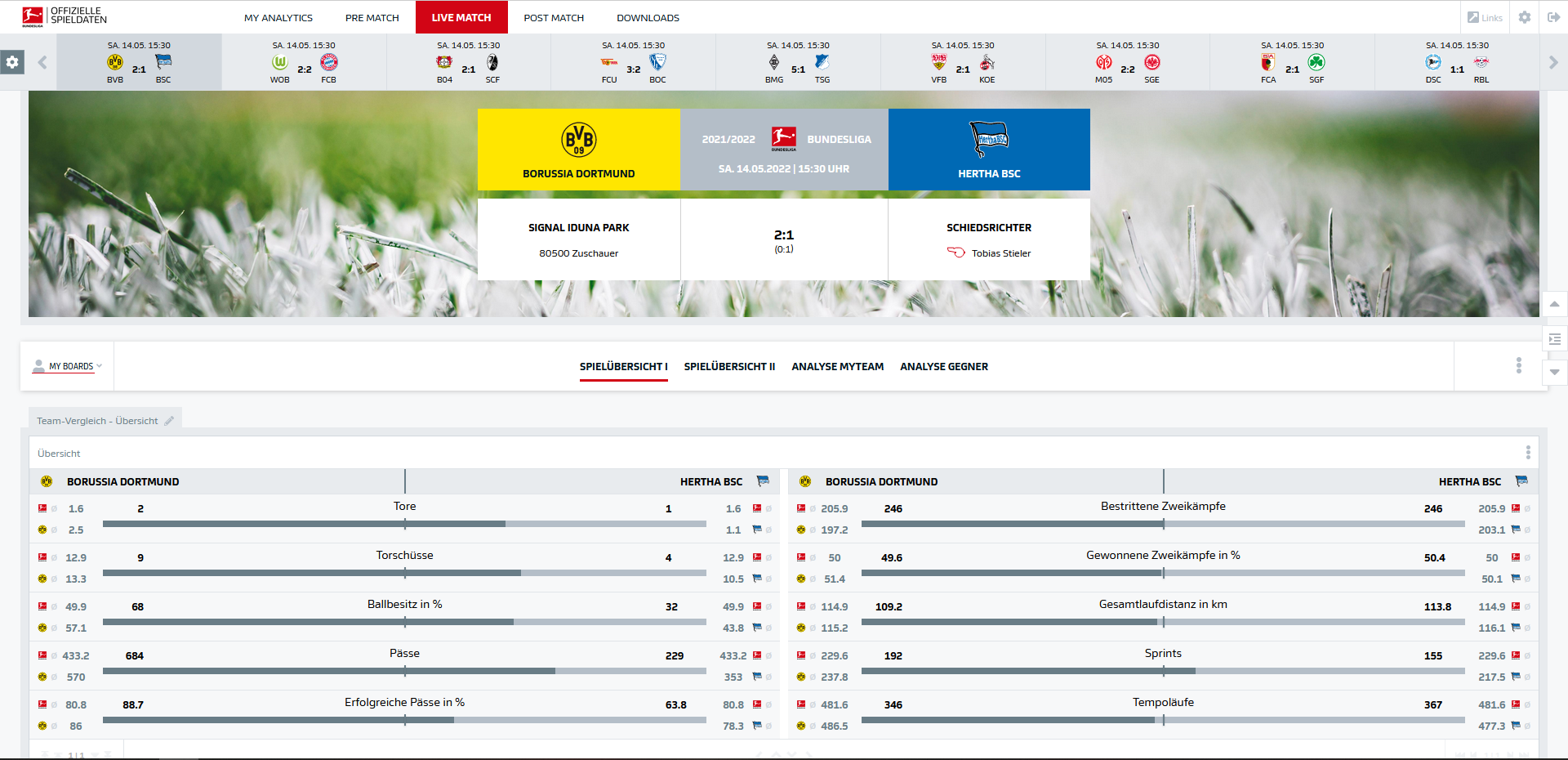The new Bundesliga Data Hub – Leading-edge digital data delivery

Whether at the stadium or in front of the screen, today’s fans have access to a wide array of match data-based information before, during and after a match. The sheer volume of this information and the high delivery speed require sophisticated technologies, efficient workflows and innovative digital processes.
The basis of these services is a centralised data management platform which structures the captured raw data and stores it in a database, transforms it into useful data feeds, enhances it and makes it available in custom-tailored packages to the clubs, DFL media partners and other subscribers. This platform is the Bundesliga Data Hub, a modular full-service software solution combining all match and player-related data streams, interpreting them, and structuring them in largely automated processes based on a wide range of criteria for the benefit of users.
The Bundesliga Data Hub is the core infrastructure of Sportec Solutions AG, a joint venture of DFL and Deltatre specialising in match data services. The cloud, server and processing infrastructure, including the enormous processing power needed for the Data Hub, is provided by Amazon Web Services (AWS).

Flexible, modular solution concept
“The Bundesliga Data Hub is a modular system,” explains Fabian Winckler, Head of Commercial at Sportec Solutions, who has been involved with the system for many years. “This architecture allows us to offer many different product combinations tailored to the needs of any given customer.”
Having received a substantial performance boost and scalability upgrade, the Bundesliga Data Hub is optimised for peak loads. This gives the system an exceptional amount of flexibility for many different usage scenarios. “It is our goal to develop a product portfolio that helps customers of any type in the international market to improve their data ecosystems,” says Winckler.
International customers
Because of its architecture the Bundesliga Data Hub not only caters to the data delivery needs of a wide array of DFL customers but is also a product in and by itself that can be used by other sport organisers – other leagues, and in the medium term, other sport disciplines, as well. “For example, the DFB uses the Data Hub for more than 100 international matches per year and all matches of the DFB Cup. This creates a consistent data distribution landscape for German football: Clubs can get the same data feeds for their DFB Cup matches as for Bundesliga and Bundesliga 2 games. Using extensions based on the Data Hub, clubs and media can even compare DFB Cup matches with Bundesliga matches using the same match analysis platform,” Winckler points out.

The international customer base includes the Swiss Football League, among others. In this case, STS provides the system while the customer captures the data independently. In all cases it is up to the customer whether to host the Data Hub externally or accesses it on DFL infrastructure.
Benefiting from a lake of data
One of the main components of the Bundesliga Data Hub value chain is its Data Lake, a huge database of event and tracking statistics. It combines with powerful data mining and machine learning engines which evaluate the steadily growing data assets using sophisticated algorithms. A “Data Story Finder” extracts requested content related to specific topics. The same functionality generates the Bundesliga Match Facts powered by AWS. “When we speak with potential customers, whether domestic, European or non-European, the data lake with its KPI evaluations is always a key aspect that makes the Data Hub very attractive,” Winckler stresses.

Data for the clubs
Customers receive the requested feeds tailored to their interests and contract terms. Even ‘micro customers’ who subscribe to a small selection of data only can be served accordingly. For example, many sponsors just receive the table and data relating to their regional clubs. Furthermore, each customer can choose whether to get the data by push or pull delivery.
Bundesliga and Bundesliga 2 clubs can be granted more than one type of access, such as one data configuration for performance analytics and another one for their media department. Certain feeds are available to them free of charge, especially those of interest to their club media departments for purposes such as the live ticker.
As a “breathing” system, the Bundesliga Data Hub is continuously updated, expanded and enhanced. Sportec Solutions, as the DFL’s in-house partner, is committed to responding to the market demand flexibly and creating suitable new products to further develop the range of services for clubs and fans.
The launch of the Bundesliga Data Hub created a new foundation for the modernisation of sport data processing by STS. As a cloud-based application, the Data Hub relies on the “Elastic Kubernetes Service” by Amazon Web Services, DFL’s technology provider. Its outstanding performance supports very high access numbers while ensuring high resilience. The event-driven architecture allows the Data Hub to provide up-to-the-minute data with minimum latency. The Hub can be extended easily, operated cost-effectively and updated flexibly in response to its dynamic market environment.

